To manage a business, you will have to interact with a large number of clients and
vendors to whom you will sell goods and services and acquire raw materials. All
of these tasks are carried out autonomously, with the assistance of remote technology.
This is a distinct group of business establishments with whom your firm has cooperated
to strive towards a common objective of being the greatest at what you do. Whether
owned by the same person or by a separate person, these enterprises will function
under an agreement. Products and services will be moved between each other based
on the requirements.
In some cases, an organization will work with a different firm dealing in a different
field to carry out activities under the partner's name. Both companies will gain
from this since it will lower their import and export taxes and broaden their consumer
base. Odoo ERP has unique Partner and Partnership management capabilities to support
the operations of a business's Partner function. Because of a distinct Ledger and
the feature of internal transfer between partners and collective holding, the element
of partnership operations may be clearly identified in Odoo operations.
The financial elements of Partner operations are critical for the business as well
as the establishment of targeted management strategies. The Odoo Accounting module
will help with the financial administration of the Partner activities. Furthermore,
the Odoo platform supports the reporting aspects of partner functionality through
the Partner-specific reports in the Accounting module's Reporting menu. Thanks to
report creation options such as Partner Ledger reporting, Aged Receivable reports,
and Aged Payable reporting features, you can be certain that you have a firm understanding
and analysis of the financial parts of your business's Partner activities. We'll
go through each of these partner report types in further depth in the sections that
follow.
Partner Ledger
The Odoo Accounting module's Partner Ledger reporting option provides information
on the partners' Ledge data as well as completed entries. In addition, the financial
features of each Partner Ledger will be presented. The menu might be caused by the
Reporting tab of the Odoo platform's Accounting module. The menu will list all of
the Others who work for your firm. You may increase the summary and entries under
each Partner by using the drop-down arrow option. This section will describe all
Partners, the Transaction Date, Journal Involved, Transaction Account, Transaction
Reference Details, and the Transaction Date. Furthermore, the Due Date, Matching
Number, Opening Balance, and Amounts of Debit and Credit will be stated.
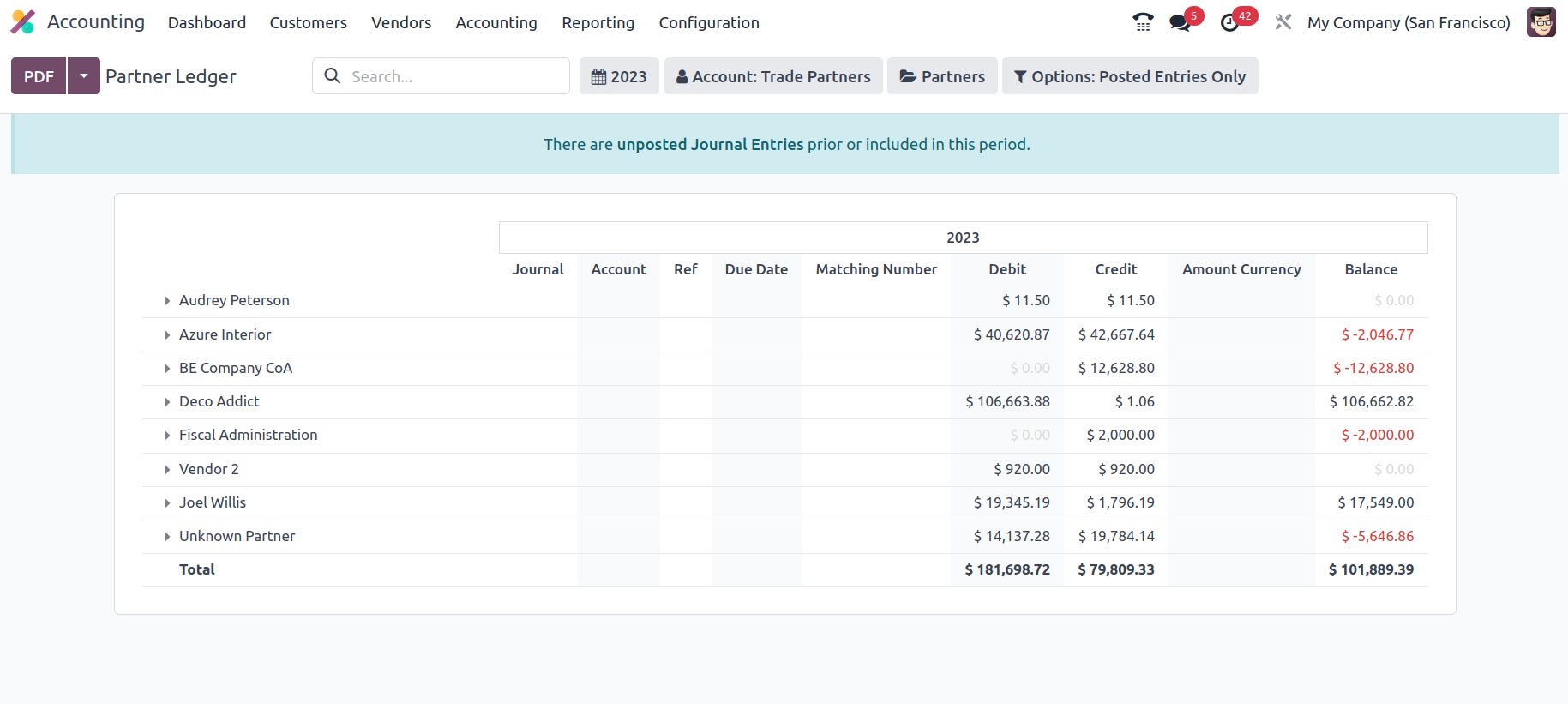
A Search option is available if the entries have been described. This search box
may be used to seek up specified Partner items. Additionally, the tools for Distinctive
filtering and Group by, which allow you to sort data according to both custom and
predefined ones provided by default, will be beneficial. The Partner Ledger entries
may be filtered by fiscal period using the Fiscal Period filtering tool, as demonstrated
in the pictures below.
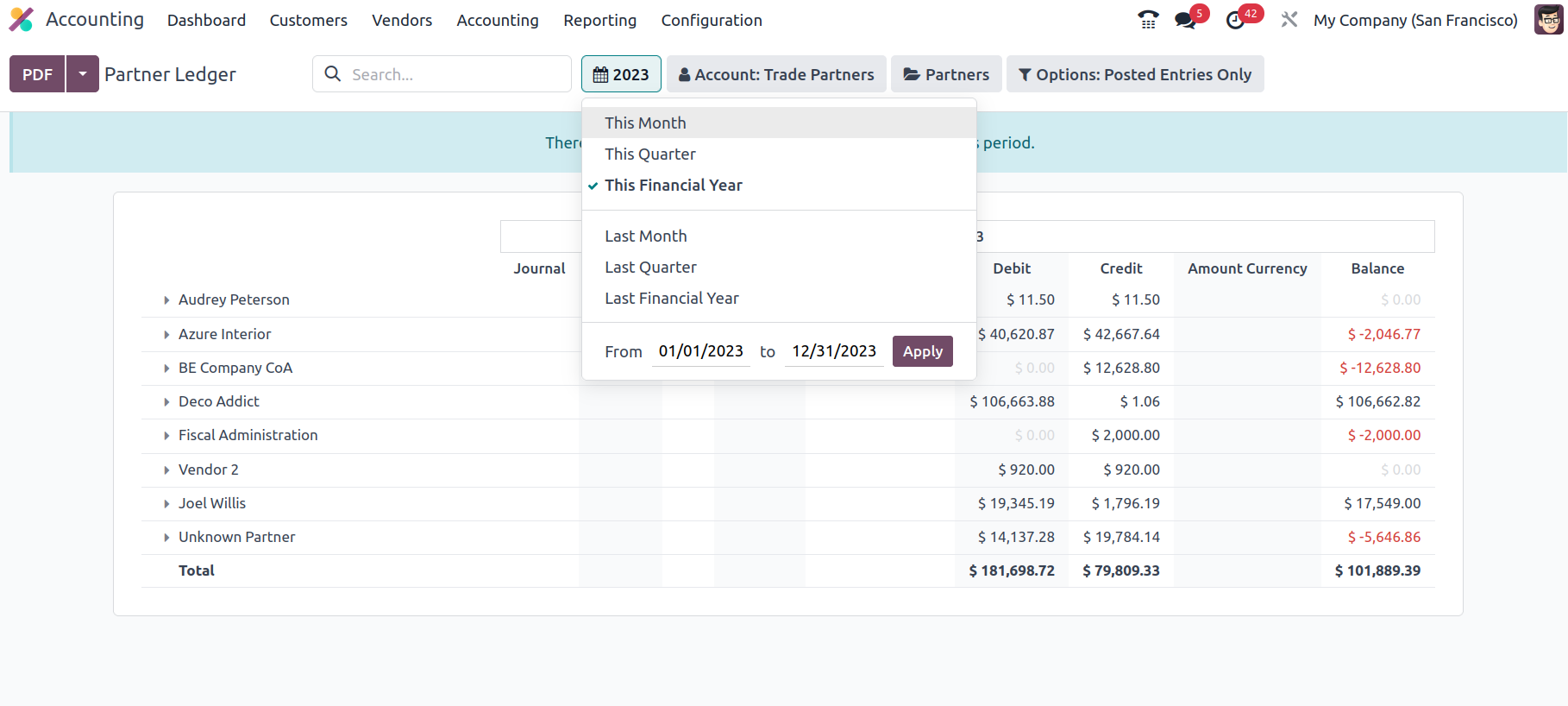
The Partner Ledger entries can also be categorized by the account in which they
are specified, whether the Receivables or Payables account. The following screenshot
depicts the sorting tool based on the Accounts on which the Partner Ledger entries
are defined.
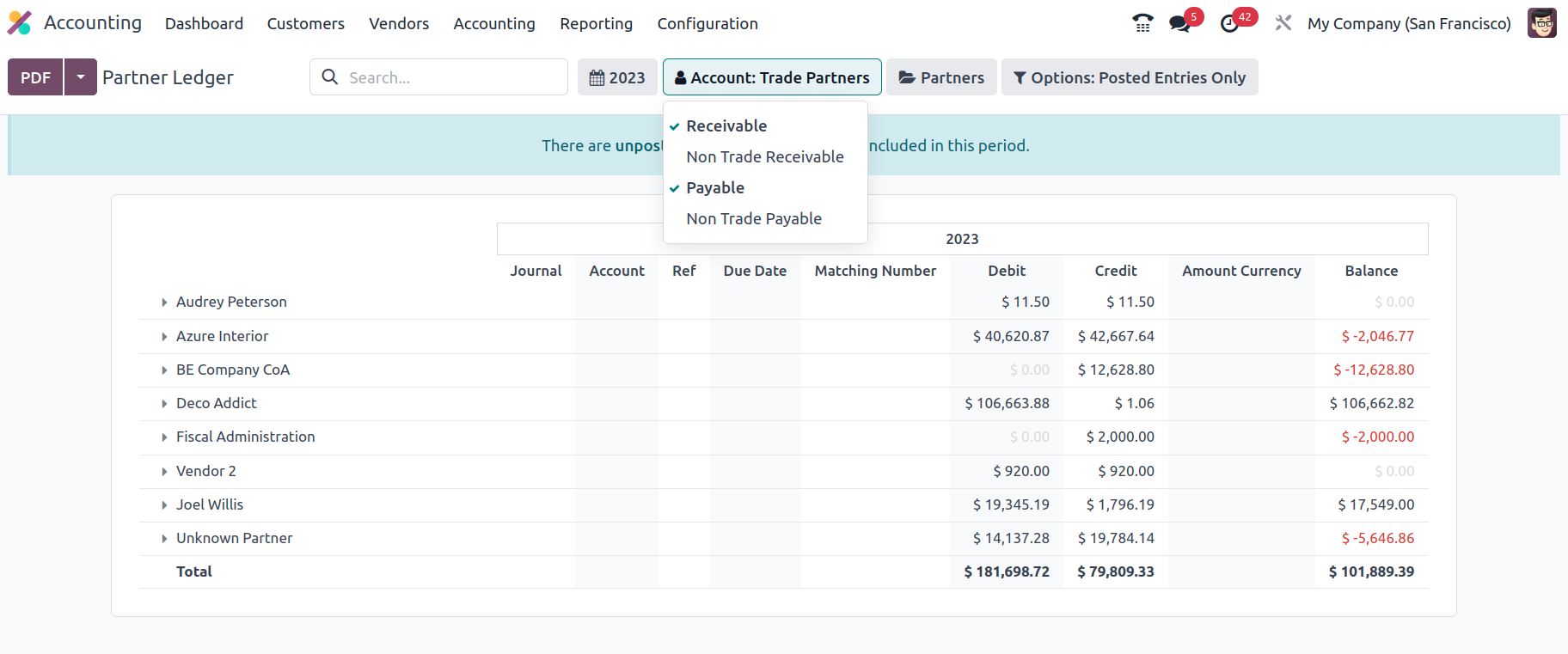
Additionally, you may utilize the Partners filter choices to specify the Partners
and Tags by selecting them from the drop-down menu, which will allow you to list
out the different Partner Ledger entries. The following screenshot describes the
Partner screening tool.
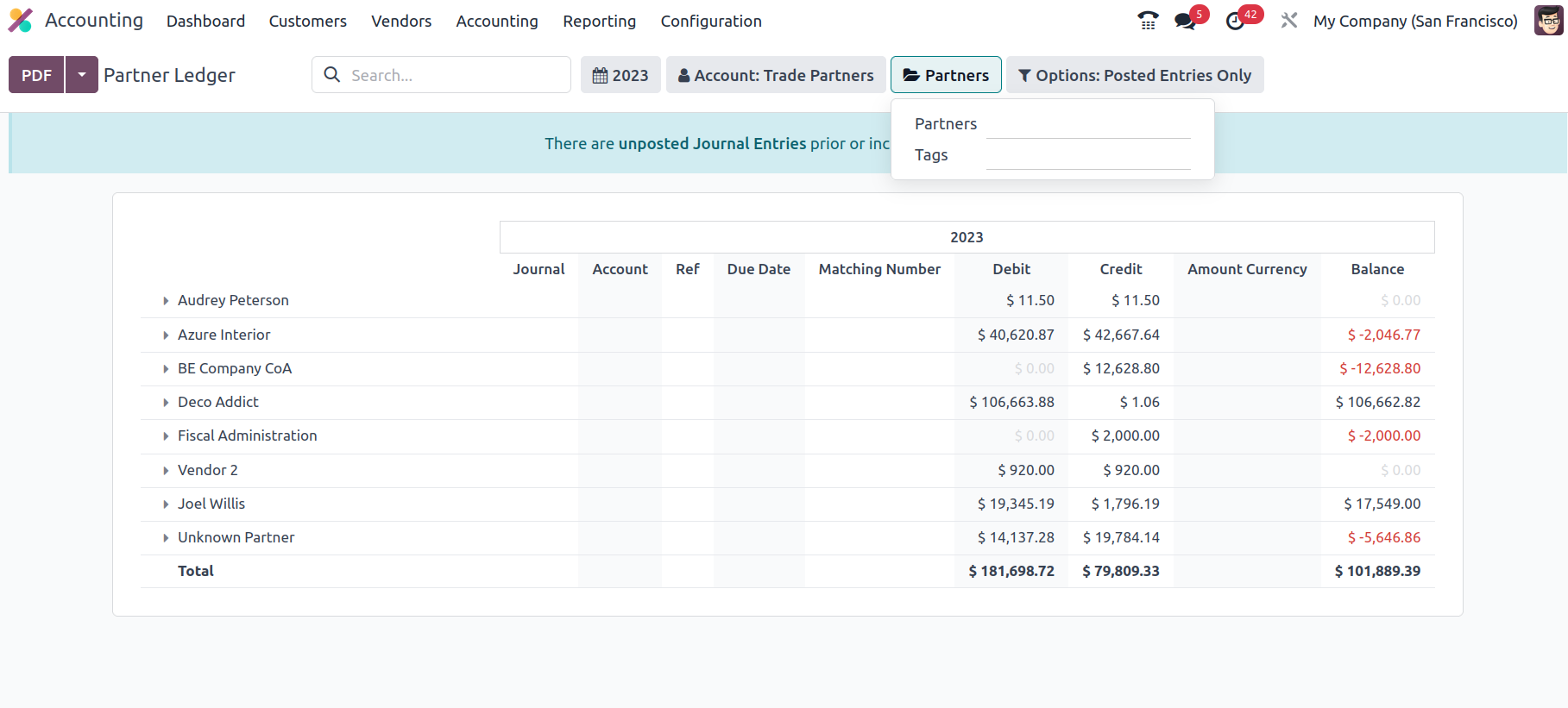
There is also a system for filtering that you can use to categorize the Partner
Ledger based on the Posted Data, Include Unposted Entries, Only See Unreconciled
Entries, or Unfold All to see all the specified Partner Ledger entries. There are
also buttons for printing reports in PDF and XLSX formats. Additionally, after altering
the entries, the Partner Ledger report may be saved using the available SAVE option.
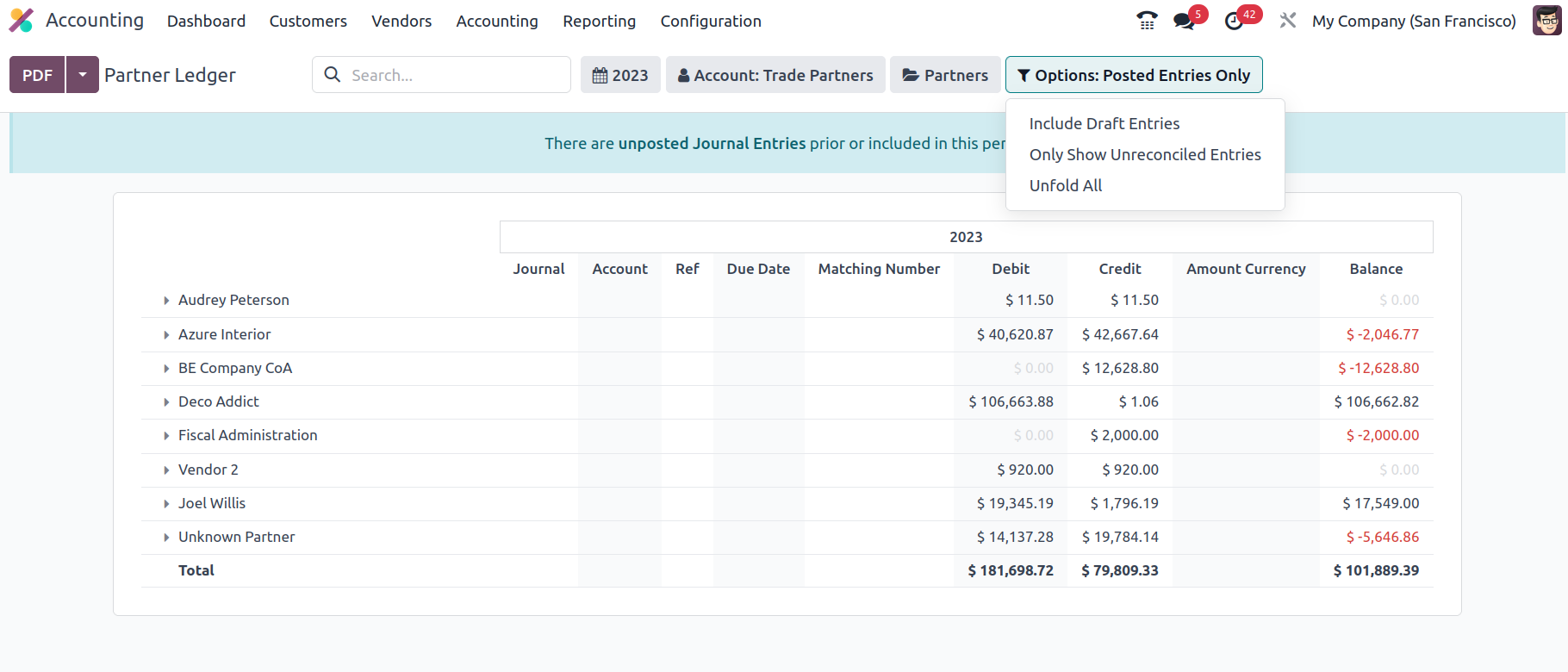
To reconcile the financial entries defined in relation to the partner operations,
select one of the Reconcile options under each of the Partners defined in the Partner
Ledger. After clicking Reconcile, you will be taken to the Partner's specific Reconcile
window, where you can choose whether to reconcile or not.

The Odoo Accounting module's Partner Ledger reporting tool will provide you with
information on how the financial operations of the Partners compare to those of
the firm. Furthermore, you will be able to sort out the essential information by
using unique filtering and grouping features, making it an important tool for the
organization. Now that we understand how Partner Ledger reports work, let's move
on to the next partner-based report type in the Odoo Accounting module, the Aged
Receivable reporting menu.
Aged Receivable
When a partner or client fails to pay for products and services, they are classified
as old receivable payments by the firm. The Delayed Amount will be classed as an
Aged Receivable even after the set payment time has elapsed. Assume that the payment
period is 10 days and that the invoice date is December 1st, 2024. As a result,
the payment is considered Aged Receivable if the client has not made it by the corresponding
payment period, which is 10 December 2024.
As a result, on December 22nd, this sum will be Aged Receivable in 1-30 days. This
classification will allow the firm to follow up on the payment, ensuring that you
get paid before it is too late. Aged Receivable reporting will be critical to the
business in Odoo, where controlling the company's operations is critical. The Aged
Receivable reports, which come under the Partner-based reports of the firm utilizing
the Odoo Accounting module, will provide you with a better understanding of how
the company handles delayed payments that have not yet been received.
The Aged Receivable reports are accessible via the Reporting tab of the Odoo Accounting
module. The Aged Receivable entries will be displayed here based on the existing
partners and customers. All entries relevant to the partner will be shown and accessible
via the various drop-down arrow choices. The partner or customer information will
be displayed here, and as the arrow is moved down, the invoice information for each
of their aged receivables will be displayed separately. Furthermore, the Report
Date, Journal Details, Amount Involved, and Expiration Date are all displayed as
1- 30, 31-60, 61-90, 91-120, and older, respectively, to indicate the amount to
be paid if the payment is extended depending on the length. The entire amount owed
will also be shown at the conclusion. The screenshot below shows the Aged Receivable
reporting option, which defines all Aged Receivable elements.
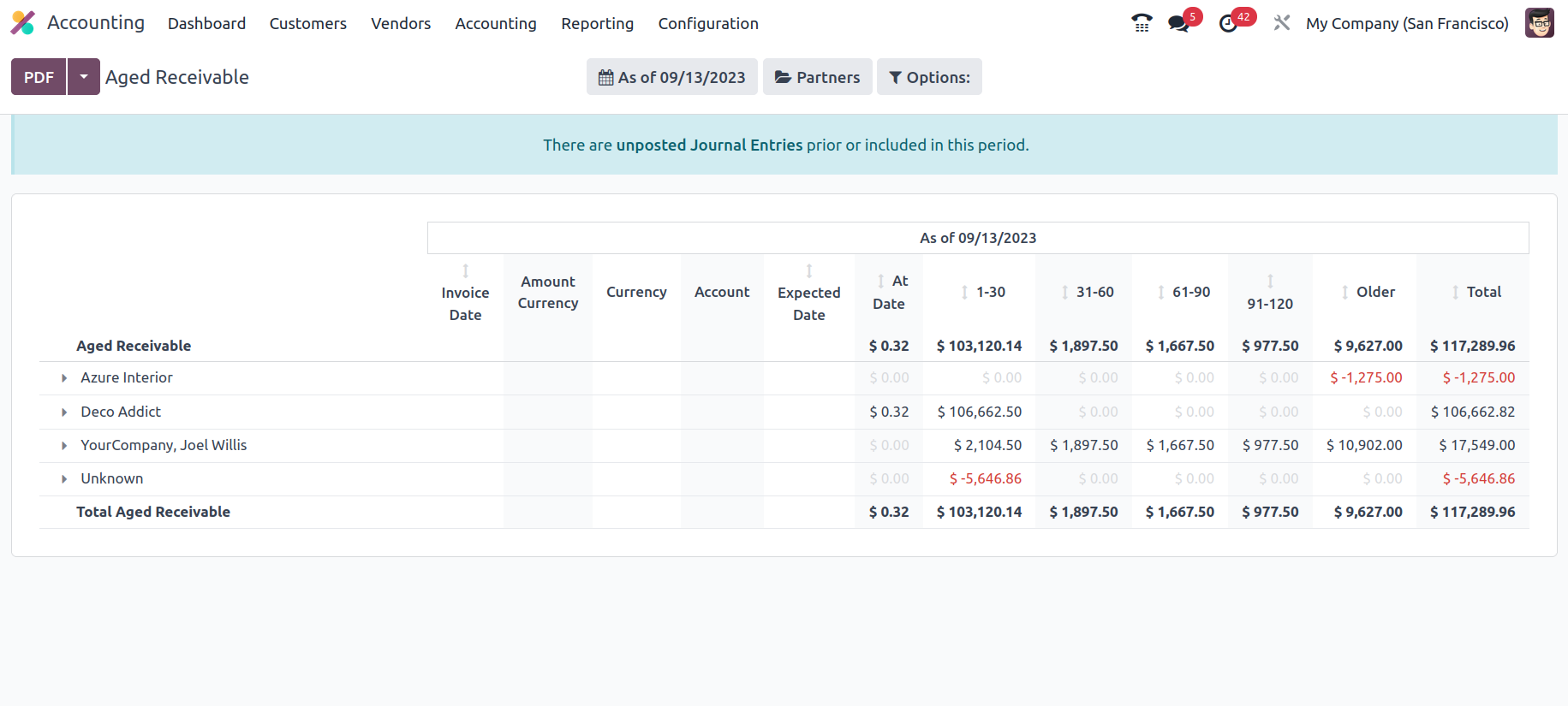
Furthermore, the various filtering and Group by features will aid you in organizing
the information according to your requirements. To help in sorting procedures, you
may utilize both conventional and accessible custom tools. The fiscal period can
be used as the foundation for the initial filtering, as seen in the picture below.
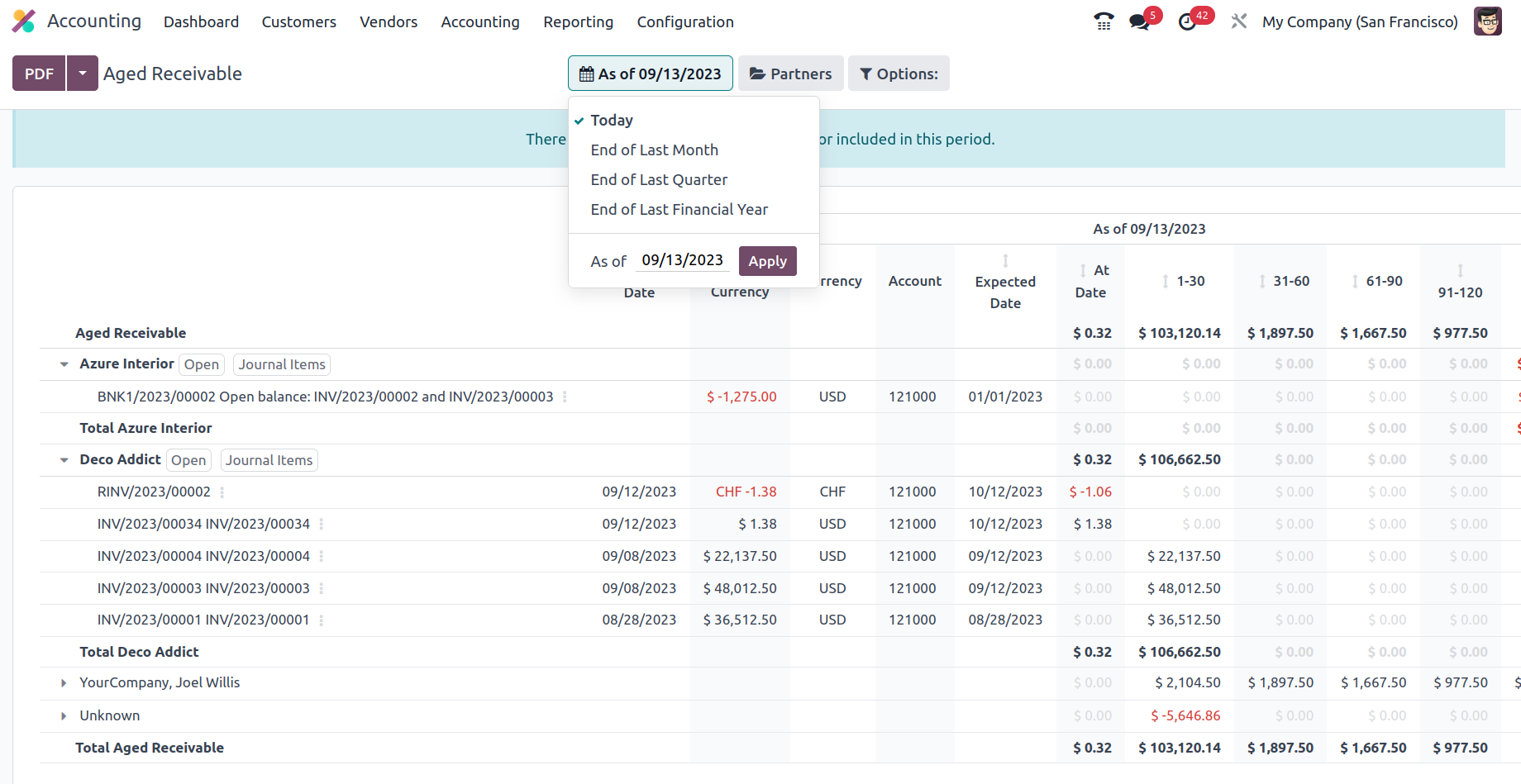
The Partner-based filtering tool will then be displayed, with the Partners and any
related tags defined and selectable from a drop-down menu. You will be provided
a list of all operating Partners as well as the Tags attached to them, from which
you may choose.
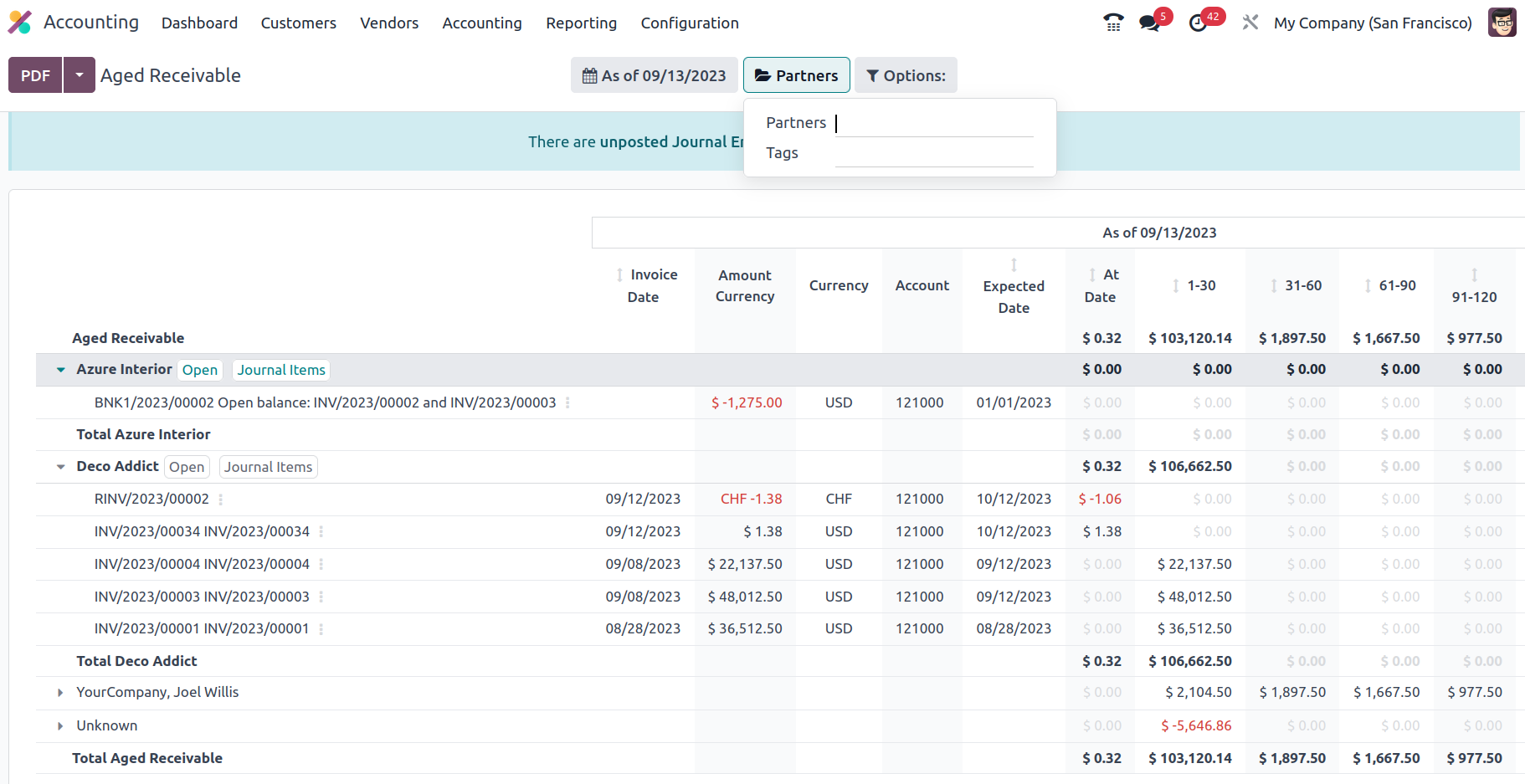
Under the Options tab, you may choose Unfold All Filtering, which will display all
items for Aged Receivable. There are also buttons that allow you to print reports
in PDF and XLSX formats. The Store button saves reports to the proper place in the
Documents modules, allowing you to keep financial information.
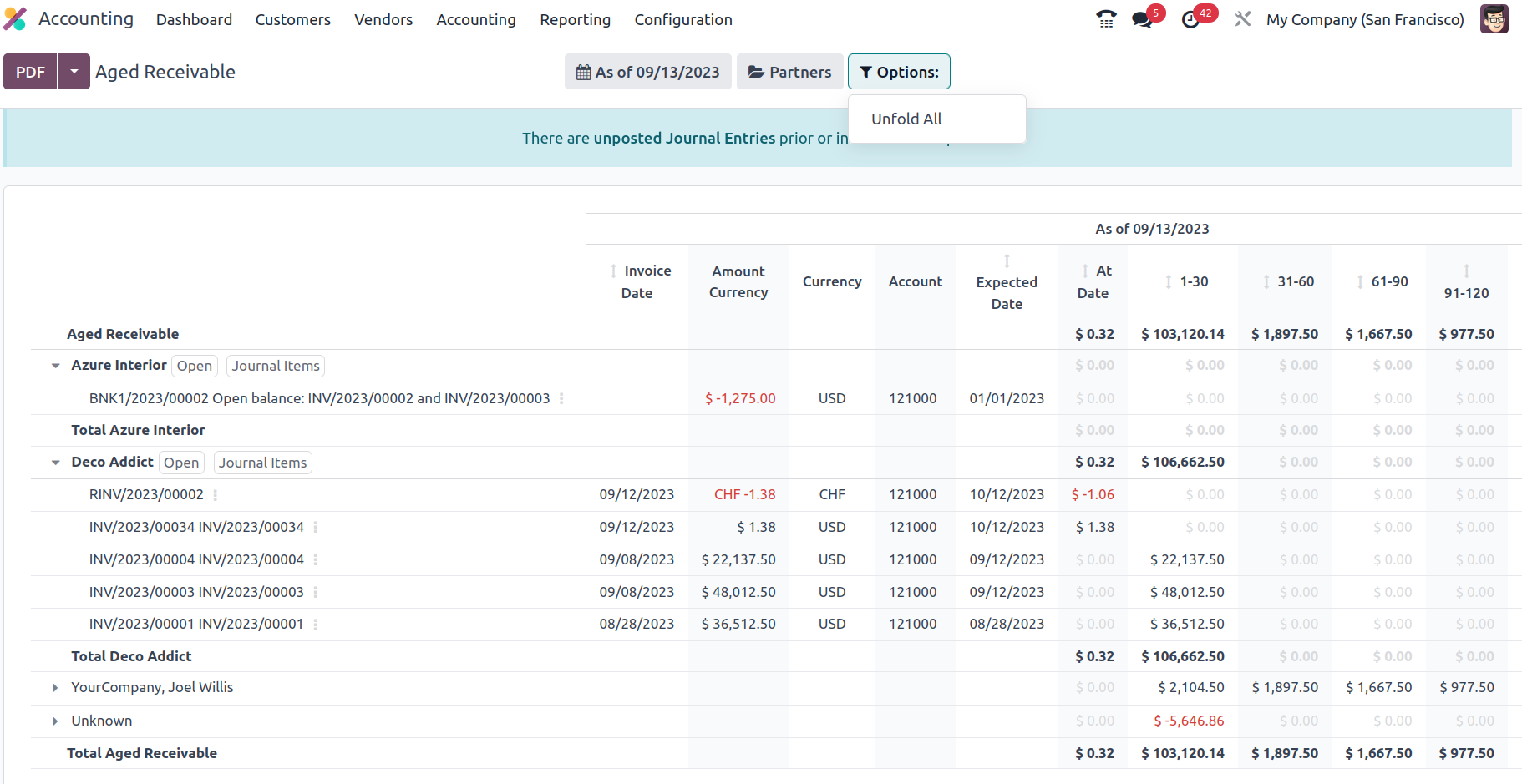
Let's move on to the next step, where the next partner foundation for reporting
the Aged Payable reports is created now that we're clear on the Aged Receivable
report function, which is available in the Odoo platform's Accounting module.
Aged Payable
Aged Receivable reports in the Odoo Accounting module are the same as the Aged Payable
reporting function in Odoo. The report, on the other hand, will be based on the
late payment that your company must make to the partner.
With the aid of this reporting capability, you will be able to appreciate the element
of the delayed payments that you should have made. The Business Operations Partners
or Vendors will be specified, and the Aged Payable entries for each of them will
be defined in the Aged Payable reports, exactly as they are in the Aged Receivable
reports.
Similarly, the entries in the Aged Payable reports will show the Report Date, Journal
details, Amount involved, Expiration date is any depreciation increase the amount
as the duration passed will be depicted as 1- 30, 31-60, 61-90, 91-120 and older
ones indicating the amount to be paid if the payment is extended based on the duration.
The entire amount owed will also be shown at the conclusion. The screenshot below
shows the Aged Payable reporting menu, which defines all Aged Receivable elements.
Filtering options in the Aged Payable report are equivalent to those in the Aged
Receivable reports, as illustrated in the image below.
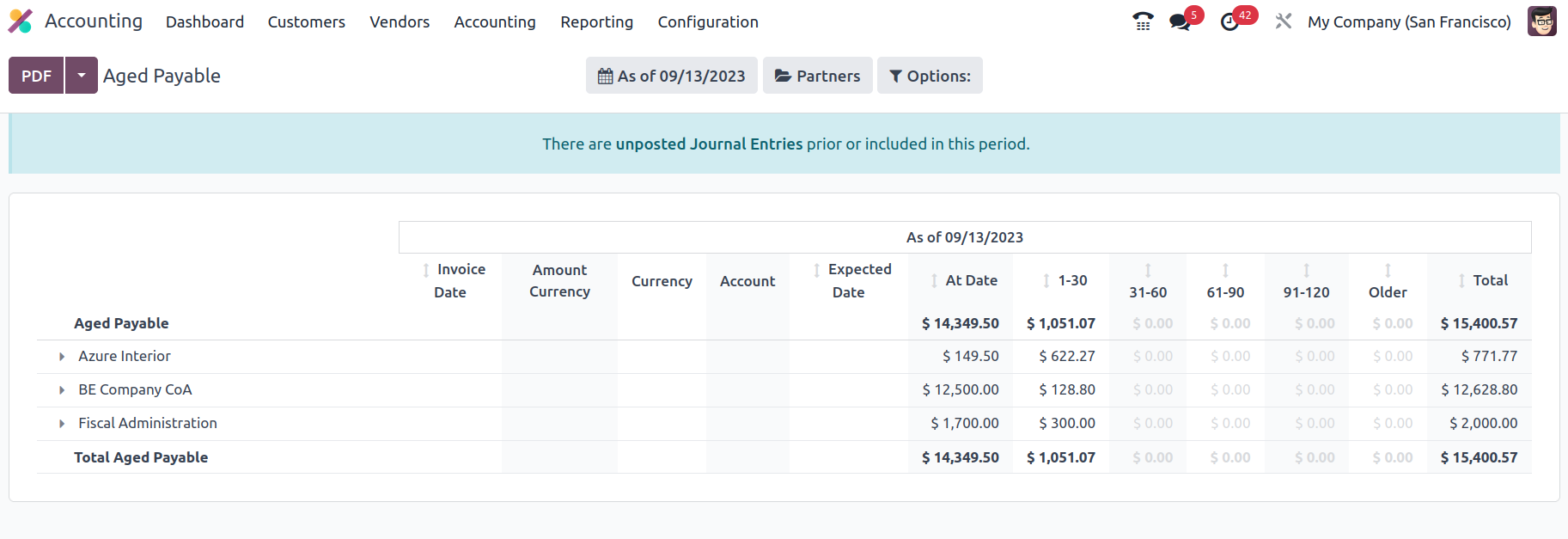
Let's move on to the next section of the chapter now that we've covered all of the
partner-based reporting tools. These are all of the partner-based reporting capabilities
available in the Odoo platform's accounting module. The definition of management
reports will be supplied in the next section of the chapter.